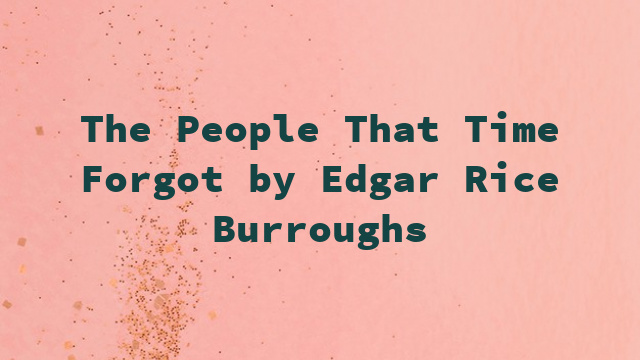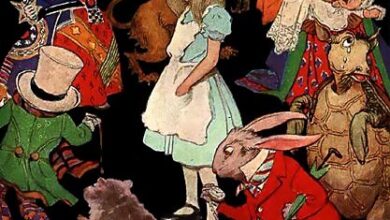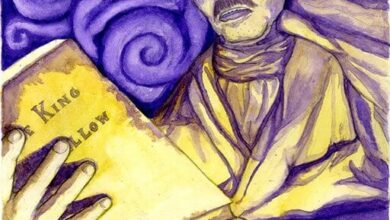
The People That Time Forgot by Edgar Rice Burroughs
Chapter IV
We spent two days upon the cliff-top, resting and recuperating. There was some small game which gave us meat, and the little pools of rainwater were sufficient to quench our thirst. The sun came out a few hours after we emerged from the cave, and in its warmth we soon cast off the gloom which our recent experiences had saddled upon us.
Upon the morning of the third day we set out to search for a path down to the valley. Below us, to the north, we saw a large pool lying at the foot of the cliffs, and in it we could discern the women of the Band-lu lying in the shallow waters, while beyond and close to the base of the mighty barrier-cliffs there was a large party of Band-lu warriors going north to hunt. We had a splendid view from our lofty cliff-top. Dimly, to the west, we could see the farther shore of the inland sea, and southwest the large southern island loomed distinctly before us. A little east of north was the northern island, which Ajor, shuddering, whispered was the home of the Wieroo–the land of Oo-oh. It lay at the far end of the lake and was barely visible to us, being fully sixty miles away.
From our elevation, and in a clearer atmosphere, it would have stood out distinctly; but the air of Caspak is heavy with moisture, with the result that distant objects are blurred and indistinct. Ajor also told me that the mainland east of Oo-oh was her land–the land of the Galu. She pointed out the cliffs at its southern boundary, which mark the frontier, south of which lies the country of Kro-lu–the archers. We now had but to pass through the balance of the Band-lu territory and that of the Kro-lu to be within the confines of her own land; but that meant traversing thirty-five miles of hostile country filled with every imaginable terror, and possibly many beyond the powers of imagination. I would certainly have given a lot for my plane at that moment, for with it, twenty minutes would have landed us within the confines of Ajor’s country.
We finally found a place where we could slip over the edge of the cliff onto a narrow ledge which seemed to give evidence of being something of a game-path to the valley, though it apparently had not been used for some time. I lowered Ajor at the end of my rifle and then slid over myself, and I am free to admit that my hair stood on end during the process, for the drop was considerable and the ledge appallingly narrow, with a frightful drop sheer below down to the rocks at the base of the cliff; but with Ajor there to catch and steady me, I made it all right, and then we set off down the trail toward the valley. There were two or three more bad places, but for the most part it was an easy descent, and we came to the highest of the Band-lu caves without further trouble. Here we went more slowly, lest we should be set upon by some member of the tribe.
We must have passed about half the Band-lu cave-levels before we were accosted, and then a huge fellow stepped out in front of me, barring our further progress.
“Who are you?” he asked; and he recognized me and I him, for he had been one of those who had led me back into the cave and bound me the night that I had been captured. From me his gaze went to Ajor. He was a fine-looking man with clear, intelligent eyes, a good forehead and superb physique–by far the highest type of Caspakian I had yet seen, barring Ajor, of course.
“You are a true Galu,” he said to Ajor, “but this man is of a different mold. He has the face of a Galu, but his weapons and the strange skins he wears upon his body are not of the Galus nor of Caspak. Who is he?”
“He is Tom,” replied Ajor succinctly.
“There is no such people,” asserted the Band-lu quite truthfully, toying with his spear in a most suggestive manner.
“My name is Tom,” I explained, “and I am from a country beyond Caspak.” I thought it best to propitiate him if possible, because of the necessity of conserving ammunition as well as to avoid the loud alarm of a shot which might bring other Band-lu warriors upon us. “I am from America, a land of which you never heard, and I am seeking others of my countrymen who are in Caspak and from whom I am lost. I have no quarrel with you or your people. Let us go our way in peace.”
“You are going there?” he asked, and pointed toward the north.
“I am,” I replied.
He was silent for several minutes, apparently weighing some thought in his mind. At last he spoke. “What is that?” he asked. “And what is that?” He pointed first at my rifle and then to my pistol.
“They are weapons,” I replied, “weapons which kill at a great distance.” I pointed to the women in the pool beneath us. “With this,” I said, tapping my pistol, “I could kill as many of those women as I cared to, without moving a step from where we now stand.”
He looked his incredulity, but I went on. “And with this”–I weighed my rifle at the balance in the palm of my right hand–“I could slay one of those distant warriors.” And I waved my left hand toward the tiny figures of the hunters far to the north.
The fellow laughed. “Do it,” he cried derisively, “and then it may be that I shall believe the balance of your strange story.”
“But I do not wish to kill any of them,” I replied. “Why should I?”
“Why not?” he insisted. “They would have killed you when they had you prisoner. They would kill you now if they could get their hands on you, and they would eat you into the bargain. But I know why you do not try it–it is because you have spoken lies; your weapon will not kill at a great distance. It is only a queerly wrought club. For all I know, you are nothing more than a lowly Bo-lu.”
“Why should you wish me to kill your own people?” I asked.
“They are no longer my people,” he replied proudly. “Last night, in the very middle of the night, the call came to me. Like that it came into my head”–and he struck his hands together smartly once–“that I had risen. I have been waiting for it and expecting it for a long time; today I am a Krolu. Today I go into the coslupak” (unpeopled country, or literally, no man’s land) “between the Band-lu and the Kro-lu, and there I fashion my bow and my arrows and my shield; there I hunt the red deer for the leathern jerkin which is the badge of my new estate. When these things are done, I can go to the chief of the Kro-lu, and he dare not refuse me. That is why you may kill those low Band-lu if you wish to live, for I am in a hurry.
“But why do you wish to kill me?” I asked.
He looked puzzled and finally gave it up. “I do not know,” he admitted. “It is the way in Caspak. If we do not kill, we shall be killed, therefore it is wise to kill first whomever does not belong to one’s own people. This morning I hid in my cave till the others were gone upon the hunt, for I knew that they would know at once that I had become a Kro-lu and would kill me. They will kill me if they find me in the coslupak; so will the Kro-lu if they come upon me before I have won my Kro-lu weapons and jerkin. You would kill me if you could, and that is the reason I know that you speak lies when you say that your weapons will kill at a great distance. Would they, you would long since have killed me. Come! I have no more time to waste in words. I will spare the woman and take her with me to the Kro-lu, for she is comely.” And with that he advanced upon me with raised spear.
My rifle was at my hip at the ready. He was so close that I did not need to raise it to my shoulder, having but to pull the trigger to send him into Kingdom Come whenever I chose; but yet I hesitated. It was difficult to bring myself to take a human life. I could feel no enmity toward this savage barbarian who acted almost as wholly upon instinct as might a wild beast, and to the last moment I was determined to seek some way to avoid what now seemed inevitable. Ajor stood at my shoulder, her knife ready in her hand and a sneer on her lips at his suggestion that he would take her with him.
Just as I thought I should have to fire, a chorus of screams broke from the women beneath us. I saw the man halt and glance downward, and following his example my eyes took in the panic and its cause. The women had, evidently, been quitting the pool and slowly returning toward the caves, when they were confronted by a monstrous cave-lion which stood directly between them and their cliffs in the center of the narrow path that led down to the pool among the tumbled rocks. Screaming, the women were rushing madly back to the pool.
“It will do them no good,” remarked the man, a trace of excitement in his voice. “It will do them no good, for the lion will wait until they come out and take as many as he can carry away; and there is one there,” he added, a trace of sadness in his tone, “whom I hoped would soon follow me to the Kro-lu. Together have we come up from the beginning.” He raised his spear above his head and poised it ready to hurl downward at the lion. “She is nearest to him,” he muttered. “He will get her and she will never come to me among the Kro-lu, or ever thereafter. It is useless! No warrior lives who could hurl a weapon so great a distance.”
But even as he spoke, I was leveling my rifle upon the great brute below; and as he ceased speaking, I squeezed the trigger. My bullet must have struck to a hair the point at which I had aimed, for it smashed the brute’s spine back of his shoulders and tore on through his heart, dropping him dead in his tracks. For a moment the women were as terrified by the report of the rifle as they had been by the menace of the lion; but when they saw that the loud noise had evidently destroyed their enemy, they came creeping cautiously back to examine the carcass.
The man, toward whom I had immediately turned after firing, lest he should pursue his threatened attack, stood staring at me in amazement and admiration.
“Why,” he asked, “if you could do that, did you not kill me long before?”
“I told you,” I replied, “that I had no quarrel with you. I do not care to kill men with whom I have no quarrel.”
But he could not seem to get the idea through his head. “I can believe now that you are not of Caspak,” he admitted, “for no Caspakian would have permitted such an opportunity to escape him.” This, however, I found later to be an exaggeration, as the tribes of the west coast and even the Kro-lu of the east coast are far less bloodthirsty than he would have had me believe. “And your weapon!” he continued. “You spoke true words when I thought you spoke lies.” And then, suddenly: “Let us be friends!”
I turned to Ajor. “Can I trust him?” I asked.
“Yes,” she replied. “Why not? Has he not asked to be friends?”
I was not at the time well enough acquainted with Caspakian ways to know that truthfulness and loyalty are two of the strongest characteristics of these primitive people. They are not sufficiently cultured to have become adept in hypocrisy, treason and dissimulation. There are, of course, a few exceptions.
“We can go north together,” continued the warrior. “I will fight for you, and you can fight for me. Until death will I serve you, for you have saved So-al, whom I had given up as dead.” He threw down his spear and covered both his eyes with the palms of his two hands. I looked inquiringly toward Ajor, who explained as best she could that this was the form of the Caspakian oath of allegiance. “You need never fear him after this,” she concluded.
“What should I do?” I asked.
“Take his hands down from before his eyes and return his spear to him,” she explained.
I did as she bade, and the man seemed very pleased. I then asked what I should have done had I not wished to accept his friendship. They told me that had I walked away, the moment that I was out of sight of the warrior we would have become deadly enemies again. “But I could so easily have killed him as he stood there defenseless!” I exclaimed.
“Yes,” replied the warrior, “but no man with good sense blinds his eyes before one whom he does not trust.”
It was rather a decent compliment, and it taught me just how much I might rely on the loyalty of my new friend. I was glad to have him with us, for he knew the country and was evidently a fearless warrior. I wished that I might have recruited a battalion like him.
As the women were now approaching the cliffs, Tomar the warrior suggested that we make our way to the valley before they could intercept us, as they might attempt to detain us and were almost certain to set upon Ajor. So we hastened down the narrow path, reaching the foot of the cliffs but a short distance ahead of the women. They called after us to stop; but we kept on at a rapid walk, not wishing to have any trouble with them, which could only result in the death of some of them.
We had proceeded about a mile when we heard some one behind us calling To-mar by name, and when we stopped and looked around, we saw a woman running rapidly toward us. As she approached nearer I could see that she was a very comely creature, and like all her sex that I had seen in Caspak, apparently young.
“It is So-al!” exclaimed To-mar. “Is she mad that she follows me thus?”
In another moment the young woman stopped, panting, before us. She paid not the slightest attention to Ajor or me; but devouring To-mar with her sparkling eyes, she cried: “I have risen! I have risen!”
“So-al!” was all that the man could say.
“Yes,” she went on, “the call came to me just before I quit the pool; but I did not know that it had come to you. I can see it in your eyes, To-mar, my To-mar! We shall go on together!” And she threw herself into his arms.
It was a very affecting sight, for it was evident that these two had been mates for a long time and that they had each thought that they were about to be separated by that strange law of evolution which holds good in Caspak and which was slowly unfolding before my incredulous mind. I did not then comprehend even a tithe of the wondrous process, which goes on eternally within the confines of Caprona’s barrier cliffs nor am I any too sure that I do even now.
To-mar explained to So-al that it was I who had killed the cave-lion and saved her life, and that Ajor was my woman and thus entitled to the same loyalty which was my due.
At first Ajor and So-al were like a couple of stranger cats on a back fence but soon they began to accept each other under something of an armed truce, and later became fast friends. So-al was a mighty fine-looking girl, built like a tigress as to strength and sinuosity, but withal sweet and womanly. Ajor and I came to be very fond of her, and she was, I think, equally fond of us. To-mar was very much of a man–a savage, if you will, but none the less a man.
Finding that traveling in company with To-mar made our journey both easier and safer, Ajor and I did not continue on our way alone while the novitiates delayed their approach to the Kro-lu country in order that they might properly fit themselves in the matter of arms and apparel, but remained with them. Thus we became well acquainted–to such an extent that we looked forward with regret to the day when they took their places among their new comrades and we should be forced to continue upon our way alone. It was a matter of much concern to To-mar that the Krolu would undoubtedly not receive Ajor and me in a friendly manner, and that consequently we should have to avoid these people.
It would have been very helpful to us could we have made friends with them, as their country abutted directly upon that of the Galus. Their friendship would have meant that Ajor’s dangers were practically passed, and that I had accomplished fully one-half of my long journey. In view of what I had passed through, I often wondered what chance I had to complete that journey in search of my friends. The further south I should travel on the west side of the island, the more frightful would the dangers become as I neared the stamping- grounds of the more hideous reptilia and the haunts of the Alus and the Ho-lu, all of which were at the southern half of the island; and then if I should not find the members of my party, what was to become of me? I could not live for long in any portion of Caspak with which I was familiar; the moment my ammunition was exhausted, I should be as good as dead.
There was a chance that the Galus would receive me; but even Ajor could not say definitely whether they would or not, and even provided that they would, could I retrace my steps from the beginning, after failing to find my own people, and return to the far northern land of Galus? I doubted it. However, I was learning from Ajor, who was more or less of a fatalist, a philosophy which was as necessary in Caspak to peace of mind as is faith to the devout Christian of the outer world.




